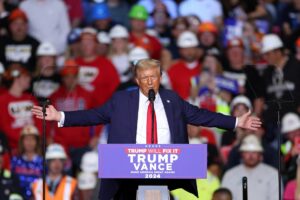Spectator Australia readers will recall the admission by Pfizer executive Janine Small that there was never any testing done to demonstrate that the Covid jab prevented transmission because ‘we had to move at the speed of science’. This admission came in an EU Parliamentary inquiry into Covid, under questioning from Dutch centre-right MEP Rob Roos. The admission blasted away the senseless justification for mandatory vaccination policies which needlessly cost so many people their livelihoods, and so much more.
Janine Small appeared at the inquiry in place of Pfizer CEO Albert Bourla, who withdrew at the last minute. Bourla has repeatedly refused to testify before the EU Parliament’s special Covid committee.
Slowly but surely, a scandal has been developing involving Bourla and EU Commission President Ursula von der Leyen, whereby it was revealed that she allegedly negotiated the EU’s biggest deal yet with Pfizer – for up to 1.8 billion doses of the Covid jab, worth up to €35 billion if fully exercised – via a series of text messages with Bourla.
As Thomas Fazi recounts, it all started when, believe it or not, the New York Times reported on the text message negotiations and deal in April 2021. What follows makes the Coate Inquiry into the Andrews’ government hotel quarantine program look rigorous. The lack of disclosure of correspondence exchanged between von der Leyen and Bourla is scary.
Following the New York Times revelations, Alexander Fanta, a journalist at the German news site netzpolitik.org, wrote to the Commission asking to access the text messages and other documents relating to the exchange between von der Leyen and Bourla. The Commission claimed no such documents existed.
Incredulous, Fanta then referred the matter to the EU Ombudsman, Emily O’Reilly, who handed down a report in January last year. O’Reilly stated in her report that no search of von der Leyen’s office for the text messages had even taken place. To justify this, O’Reilly offered a variation on the ‘there is no relationship’ response. Her office asked for items that met the Commission’s criteria for recording ‘documents’ – a definition that does not include text messages. How convenient! Therefore, O’Reilly made a recommendation that the Commission ask von der Leyen’s office to search again for relevant text messages. The Commission refused to comply, naturally.
The excuse for this refusal is, basically, ‘executive privilege’, and claims that the text messages may have been deleted due to their ‘short-lived, ephemeral nature’.
In fact, The EU’s Values and Transparency Commissioner Věra Jourová defended the Commission’s right not to keep records of the texts in view of the fact that ‘text and instant messages in general do not contain important information relating to policies, activities, and decisions of the Commission, nor are they in the possession of the institution’.
All of this is laughable if it weren’t so serious.
As Fazi reports, time went on and other EU bodies got involved, but the stonewalling continued. In September last year, the plot thickened after the European Court of Auditors published a report, accusing the Commission of refusing to disclose any details of von der Leyen’s personal role in the talks. This prompted the independent European Public Prosecutor’s Office to open an investigation into the matter, and into the EU’s Covid vaccine procurement program generally, which is still ongoing.
Now, the New York Times is taking the European Commission to court over the matter.
However, as Fazi states, it remains to be seen whether the European Public Prosecutor’s Office investigation and the New York Times lawsuit will succeed where all others have failed, especially in light of the breathtaking arrogance – not to mention disregard for democracy and accountability – in the refusal to disclose the texts in question, or even the contracts related to the purchase, despite multiple requests by some of the highest EU bodies.
What is more, the scandal is a symptom of a much deeper and more widespread malaise involving not just the European Parliament but all EU institutions. Late last year, just as the World Cup was about to commence in Qatar, the Vice President of the European Parliament, Greek centre-left representative, Eva Kaili, addressed debate on ‘human rights in the context of the World Cup’ stating that ‘Qatar is a frontrunner in labour rights’. This was in the face of allegations that thousands of migrant workers had died building Qatar’s World Cup stadium – later admitted to by tournament officials.
Then, on December 10, 2022, Kaili was one of six EU parliamentarians – all of the Greek centre-left – arrested in an investigation by Brussels prosecutors into suspected Qatari corruption and money laundering. Thus what has now become known as ‘Qatargate’ was born. Members of the EU establishment were quick to spin the issue as a problem limited to a few bad apples. However, since then, as reported by the Italian daily il Giornale, prosecutors in that country are preparing to request the EU Parliament revoke immunity for leaders of the Italian centre-left grouping in Brussels, namely Antonio Panzieri and Andrea Cozzolino, and Belgian representatives Marc Tarabella and Marie Arena. Kaili has named Panzieri and Cozzolino in statements attributed to her.
It doesn’t end there. The EU, by virtue of its supranational and technocratic nature, is structurally prone to capture by vested interests, be they foreign governments or multinational corporations – and no amount of reform will change that. As the researchers Lorenzo Del Savio and Matteo Mameli write: ‘International loci are in general physically, psychologically, and linguistically more distant from ordinary people than national ones are. This distance means more room for oligarchic capture.’
In this sense, the problem of EU corruption, rather than being a bug in the system, should be seen as an inherent consequence of the supranationalisation of politics.
source: spectator









